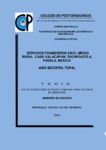| dc.description.abstract | Al referirnos al sector rural, inmediatamente lo asociamos con un panorama complejo, en el que el ingreso de las familias depende principalmente de las actividades agropecuarias y donde, desafortunadamente imperan y se agudizan las condiciones de pobreza y marginación y la población es excluida de los servicios básicos que les confieran condiciones de vida dignas. En ese contexto, resulta aún más difícil concebir la presencia de servicios complementarios que permitan atender necesidades de tipo económico, productivo y financiero. Existen propuestas por parte de diversos actores para llevar al sector rural servicios financieros que permitan a las empresas y a las familias ampliar su capacidad económica y mejorar las condiciones de vida. Iniciativa que ha resultado todo un desafío, dada la escasez y el costo de la infraestructura financiera, pero sobre todo, por la incompatibilidad entre los esquemas empleados por los oferentes y las necesidades y características del sector. Por lo cual, pese a la cantidad (2457) y diversidad (bancos, sociedades financieras, uniones de crédito, almacenes generales de depósito, etc.) de instituciones financieras que integran el Sistema Financiero Mexicano, pocas son las entidades que han incursionado en el medio rural. Bajo ese contexto, la presente investigación se suma a los esfuerzos por comprender la dinámica económica de las economías rurales, evaluando su compatibilidad con los esquemas y servicios financieros formales e informales disponibles y empleados por la población rural, a partir del análisis de 4 ejes de investigación que comprenden: perfil de la población, dinámica económica, necesidades de servicios financieros y cultura financiera. Las conclusiones apuntan a que no se trata de un problema de acceso o infraestructura financiera, sino de cultura y educación financiera, así como de un desconocimiento recíproco entre los oferentes y los usuarios de los servicios financieros rurales, lo cual distorsiona e impide atender total y oportunamente las necesidades de la población rural. _______________ FINANCIAL SERVICES IN RURAL AREAS, CASE STUDY: XALACAPAN, MUNICIPALITY OF ZACAPOAXTLA, PUEBLA. ABSTRACT: When referring to the rural sector, they immediately associate with a complex picture, where the family income depends mainly on farming and where, unfortunately prevail and exacerbate poverty and marginalization and the population is excluded from services give them basic standard of living. In this context, it is even more difficult to conceive of the presence of additional services that respond to needs of economic, productive and financial. There are proposals from various stakeholders to bring to rural financial services that allow businesses and families increase their economic capacity and improve living conditions. This initiative has proved a challenge, given the scarcity and cost of the financial infrastructure, but above all, by the incompatibility between the schemes used by the bidders and the needs and characteristics of the sector. Therefore, despite the number (2457) and diversity (banks, finance companies, credit unions, general warehouse, etc.) of financial institutions that belonging the Mexican Financial System, there are few entities that have made inroads in rural areas. Under that context, this research adds to efforts to understand the economic dynamics of rural economies, assessing their compatibility with the schedules and formal and informal financial services available and used by the rural population from the analysis of 4 lines research include: profile of the population, their economic, financial service needs and financial literacy, taking as a case study Xalacapan community, municipality of Zacapoaxtla, Puebla. The main findings of this study suggest that this is not a problem of access or financial infrastructure, but of culture and financial education, as well as mutual ignorance between suppliers and users of rural financial services, which distorts and impedes full and timely meet the needs of the rural population. | es |


